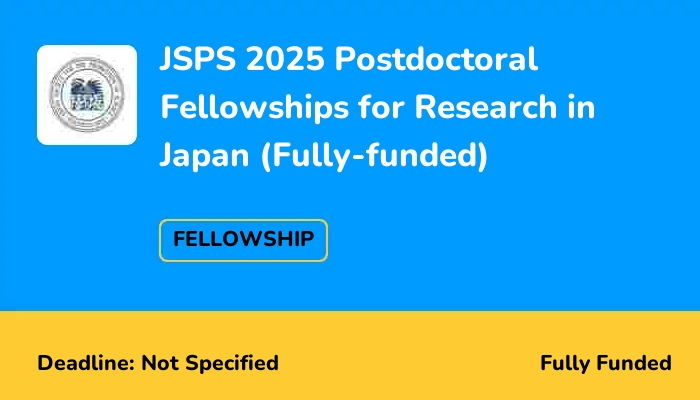 Menu
Menu
Published: 30 Sep 2024 1,304 views

The JSPS Summer Program is implemented as a component of the JSPS Postdoctoral Fellowships for Research in Japan. Carried out in partnership with The Graduate University for Advanced Studies (SOKENDAI), the program provides opportunities for young pre- and post-doctoral researchers from North America and Europe to receive an orientation on Japanese culture and research systems and to pursue research under the guidance of host researchers at a Japanese university or research institute over a period of two months during the summer.
JSPS seeks cooperation from its overseas partners in recruiting candidates for the program. In implementing this program, our overseas partners are Centre National de la Recherche Scientifique (France), Deutscher Akademischer Austauschdienst (Germany), the Canadian Embassy in Japan/Mitacs(Canada), and the Swedish Foundation for International Cooperation in Research and Higher Education (Sweden).
Two summer research programs had until 2002 been carried out under two schemes by the Ministry of Education, Culture, Sports, Science and Technology (MEXT)—one titled "MEXT Research Experience Fellowship for Young Foreign Researchers" and the other "MEXT/NSF Summer Program"—were transferred to JSPS and combined into this program entitled the "JSPS Summer Program."
The MEXT Research Experience Fellowship for Young Foreign Researchers was inaugurated in 1993 as a pilot program implemented by The Graduate University for Advanced Studies (SOKENDAI). From 1995, it came under the auspices of MEXT. SOKENDAI now partners with JSPS in carrying out the JSPS Summer Program.
On the hand, the MEXT/NSF Summer Program was initially implemented under the title "Summer Institute Program" by the Science and Technology Agency through a collaboration between the Japan Science and Technology Corporation (JST) and the National Science Foundation (NSF) in the US.
When the program was taken over by MEXT as part of the Japanese government's administrative reorganization, national laboratories became its main host institutions. Since its transfer to JSPS in 2003, host institutions have been expanded to include national, private, and public universities along with national laboratories and other institutions.
About SOKENDAI?JSPS Summer Program?click here.
The Japan Society for the Promotion of Science was founded in 1932 as a non-profit foundation through an endowment granted by Emperor Sh?wa. JSPS became a quasi-governmental organization in 1967 under the auspices of the Ministry of Education, Science, Sports and Culture (Monbusho), and after 2001 under the Ministry of Education, Culture, Sports, Science and Technology. In 2003, JSPS entered a new phase with its conversion to an Independent Administrative Institution. This new administrative configuration is intended to become a step towards improving the effectiveness and efficiency... continue reading
.jpg)
| Application Deadline | Not Specified |
| Country to study | Japan |
| Type | Fellowship |
| Course to study | View courses |
| Sponsor | Japan Society for the Promotion of Science (JSPS) |
| Gender | Men and Women |
Financial Support
Maintaenace Allowance (¥534,000)
Airfare (Airticket)
Oversea Travel Insurance
Research Support Allowance (Option)
Nationality
Be a citizen of the US, the UK, France, Germany, Canada, and Sweden (Others with equivalent status may apply if approved by the nominating authority in one of the above countries).
Academic Status
Candidates must fulfill one of the following conditions:
* Note: Researchers who obtained their PhD within six years minus time taken for maternity and/or parental leave are also eligible. (Every four weeks of leave is counted as one month, with any remaining weeks also counted as one month. These months are?subtracted from the number of years elapsed since the researcher’s PhD was?received.)
* Note: 1. Those who have previously been awarded a fellowship under the JSPS Postdoctoral Fellowships for Research in Japan are not eligible.
?This database provides scientific information on researchers in Japan.
The host researcher must, in principle, be a researcher who is employed full-time at a university or research institution as specified in Article 2* of the Procedure
for the Handling of Grants-in-Aid for Scientific Research (Kakenhi), issued by the Ministry of Education, Culture, Sports, Science and Technology (MEXT).
However, there are cases when researchers who are not employed in a full time position may be eligible. Such persons must be eligible to apply for a KAKENHI grant–in-aid and their affiliated institution must judge them able to implement the project and to provide an appropriate research environment (e.g., laboratory, equipment, personnel) for it.
*Eligible host institutions specified under the above MEXT Procedure are as follows:
Universities and inter-university research institutes
MEXT-affiliated institutions engaged in research
Colleges of technology
Institutions designated by the Minister of MEXT
*See the List of Eligible Host Institutes (PDF)
*List of Researchers of SOKENDAI (PDF)
For the Electronic Application System guideline click here.
For more details visit: JSPS website.